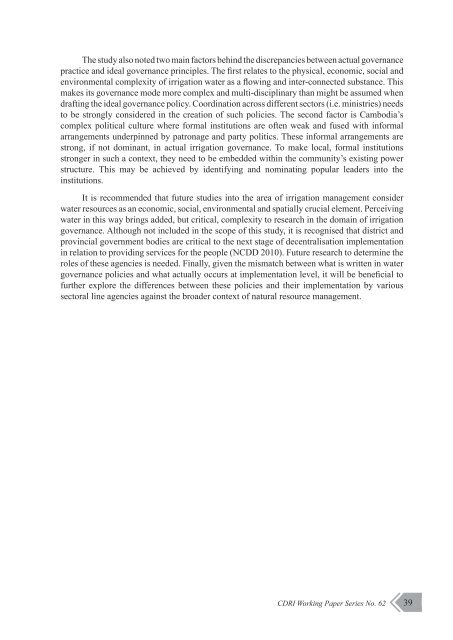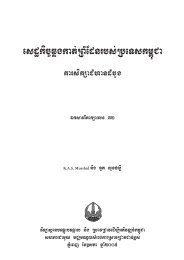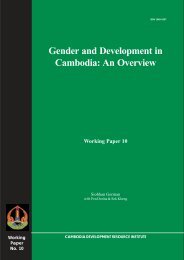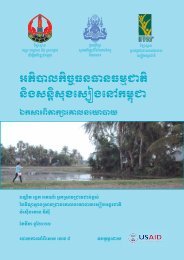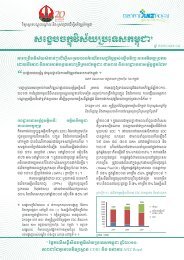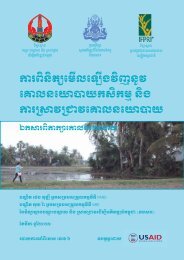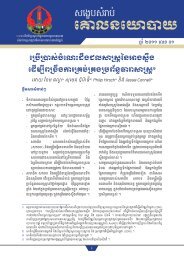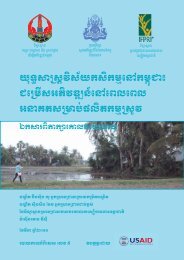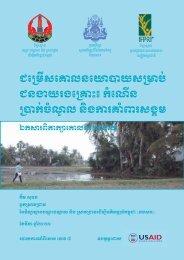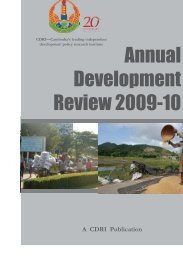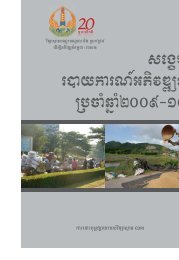62) decentralised governance of irrigation water in cambodia - CDRI
62) decentralised governance of irrigation water in cambodia - CDRI
62) decentralised governance of irrigation water in cambodia - CDRI
You also want an ePaper? Increase the reach of your titles
YUMPU automatically turns print PDFs into web optimized ePapers that Google loves.
The study also noted two ma<strong>in</strong> factors beh<strong>in</strong>d the discrepancies between actual <strong>governance</strong><br />
practice and ideal <strong>governance</strong> pr<strong>in</strong>ciples. The first relates to the physical, economic, social and<br />
environmental complexity <strong>of</strong> <strong>irrigation</strong> <strong>water</strong> as a flow<strong>in</strong>g and <strong>in</strong>ter-connected substance. This<br />
makes its <strong>governance</strong> mode more complex and multi-discipl<strong>in</strong>ary than might be assumed when<br />
draft<strong>in</strong>g the ideal <strong>governance</strong> policy. Coord<strong>in</strong>ation across different sectors (i.e. m<strong>in</strong>istries) needs<br />
to be strongly considered <strong>in</strong> the creation <strong>of</strong> such policies. The second factor is Cambodia’s<br />
complex political culture where formal <strong>in</strong>stitutions are <strong>of</strong>ten weak and fused with <strong>in</strong>formal<br />
arrangements underp<strong>in</strong>ned by patronage and party politics. These <strong>in</strong>formal arrangements are<br />
strong, if not dom<strong>in</strong>ant, <strong>in</strong> actual <strong>irrigation</strong> <strong>governance</strong>. To make local, formal <strong>in</strong>stitutions<br />
stronger <strong>in</strong> such a context, they need to be embedded with<strong>in</strong> the community’s exist<strong>in</strong>g power<br />
structure. This may be achieved by identify<strong>in</strong>g and nom<strong>in</strong>at<strong>in</strong>g popular leaders <strong>in</strong>to the<br />
<strong>in</strong>stitutions.<br />
It is recommended that future studies <strong>in</strong>to the area <strong>of</strong> <strong>irrigation</strong> management consider<br />
<strong>water</strong> resources as an economic, social, environmental and spatially crucial element. Perceiv<strong>in</strong>g<br />
<strong>water</strong> <strong>in</strong> this way br<strong>in</strong>gs added, but critical, complexity to research <strong>in</strong> the doma<strong>in</strong> <strong>of</strong> <strong>irrigation</strong><br />
<strong>governance</strong>. Although not <strong>in</strong>cluded <strong>in</strong> the scope <strong>of</strong> this study, it is recognised that district and<br />
prov<strong>in</strong>cial government bodies are critical to the next stage <strong>of</strong> decentralisation implementation<br />
<strong>in</strong> relation to provid<strong>in</strong>g services for the people (NCDD 2010). Future research to determ<strong>in</strong>e the<br />
roles <strong>of</strong> these agencies is needed. F<strong>in</strong>ally, given the mismatch between what is written <strong>in</strong> <strong>water</strong><br />
<strong>governance</strong> policies and what actually occurs at implementation level, it will be beneficial to<br />
further explore the differences between these policies and their implementation by various<br />
sectoral l<strong>in</strong>e agencies aga<strong>in</strong>st the broader context <strong>of</strong> natural resource management.<br />
<strong>CDRI</strong> Work<strong>in</strong>g Paper Series No. <strong>62</strong><br />
39


